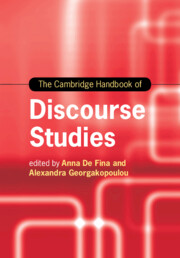Book contents
- The Cambridge Handbook of Discourse Studies
- Cambridge Handbooks in Language and Linguistics
- The Cambridge Handbook of Discourse Studies
- Copyright page
- Contents
- Figures
- Tables
- Contributors
- Preface
- Part I (Con)Textualizing Discourses
- Part II Perspectives and Modes of Analysis
- Part III Discourse Materialities and Embodiment
- Part IV (Trans)Locations and Intersections
- Part V Ethics, Inequality and Inclusion
- 21 Ethics and the Study of Discourse
- 22 Migrants, Citizenship and Language Rights
- 23 Diversity and Inclusion in Education
- 24 Discourse and Racialization
- 25 Discourse and Narrative in Legal Settings: The Political Asylum Process
- 26 Discourse and Religion in Educational Practice
- Part VI Discourses, Publics and Mediatization
- Index
- References
21 - Ethics and the Study of Discourse
from Part V - Ethics, Inequality and Inclusion
Published online by Cambridge University Press: 28 September 2020
- The Cambridge Handbook of Discourse Studies
- Cambridge Handbooks in Language and Linguistics
- The Cambridge Handbook of Discourse Studies
- Copyright page
- Contents
- Figures
- Tables
- Contributors
- Preface
- Part I (Con)Textualizing Discourses
- Part II Perspectives and Modes of Analysis
- Part III Discourse Materialities and Embodiment
- Part IV (Trans)Locations and Intersections
- Part V Ethics, Inequality and Inclusion
- 21 Ethics and the Study of Discourse
- 22 Migrants, Citizenship and Language Rights
- 23 Diversity and Inclusion in Education
- 24 Discourse and Racialization
- 25 Discourse and Narrative in Legal Settings: The Political Asylum Process
- 26 Discourse and Religion in Educational Practice
- Part VI Discourses, Publics and Mediatization
- Index
- References
Summary
Ethical issues are of central importance in the study of discourse, as in other fields. In some respects, these issues are given greater emphasis today than in the past, partly as a result of the rise of ethical regulation, but also because of some fundamental debates among researchers about the politics and ethics of their work. While the issues vary somewhat across the discourse field, here, as elsewhere, there are certain central values that underpin the practical decisions that researchers make. In this chapter, a distinction is drawn between epistemic and non-epistemic values. The first concern the process of enquiry itself – for example, the obligation to pursue worthwhile knowledge, and to do this effectively; to provide sufficient evidence in publications; to be honest about how the research was done; and to engage genuinely with critics. Non-epistemic values include minimizing harm; respecting autonomy; and maintaining reciprocity; and these represent essential constraints on how research is pursued. The chapter examines how all these values relate to discourse research, exploring the complexities involved. It is emphasized that ethicality is not a matter of following a set of rules; rather, it necessarily involves judgment, in which relevant values, along with prudential and methodological considerations, are taken into account, as they relate to the specific situations faced. The chapter ends with a consideration of ethical regulation and the problems generated by the proceduralist approach to research ethics that it tends to encourage.
Keywords
- Type
- Chapter
- Information
- The Cambridge Handbook of Discourse Studies , pp. 465 - 486Publisher: Cambridge University PressPrint publication year: 2020
References
Further Reading
This is perhaps the most useful set of ethical guidelines for the field of discourse studies; it provides comprehensive and helpful coverage of the issues.
This is a seminal work which takes a very different stance from that adopted in this chapter. Several chapters provide illuminating insights into concrete ethical problems.
This handbook examines ethical dilemmas via discussion of a wide variety of actual cases; it is designed for teaching anthropology students but is of wider value.
This is a thoughtful and helpful discussion of ethical issues specifically relating to linguistic fieldwork.
This general account of research ethics, in the context of qualitative research, elaborates on the arguments presented in this chapter.
This recent handbook contains thirty-five chapters discussing a wide range of ethical issues that can arise in carrying out qualitative research.
A useful discussion of a range of ethical debates relating to applied linguistics.
This is a review of issues arising in qualitative research in the field of applied linguistics and of some of the contrasting views taken about them.



